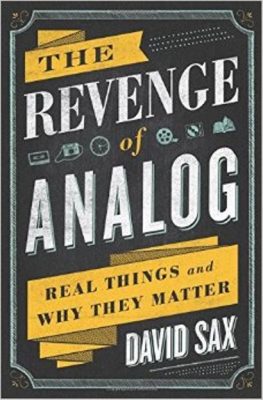When analog was necessary the goal was to go digital, go paperless, go easy, fast and simple, without boundaries or limits, with instant access and for cheap, if not free. Now analog is a choice and it is what many people are choosing.
David Sax asks, when there are computer games with intense graphics, unlimited fantasy, and worldwide opponents, why would anyone play a dumb old board game? And yet, people are lining up for three hours to get into a board game café. If you can collect all of your favorite music on one small, portable device, with near perfect quality, almost for free, without leaving your computer, why would anyone spend hours in stores to buy vinyl records? But vinyl is making a comeback.
The people going for analog aren’t old fogies who have never touched a computer and never will. They are young and techie. They love digital for what digital does; they just recognize that analog has its own virtues. It supplies experiences that digital can’t. As Scott Nicholson, owner of a board game café explains, “You have a social contract when you sit down to play a game.” Computers basically bring an experience that does not fill the human need for contact and relationships. Neither does digital provide the full experience of finding, choosing, owning, or of holding, hearing and smelling the product. When you read an article on the internet there is no paper crinkling in your hand, no smell of ink, no finishing the unending content. The digital experience can also lose the imperfections that make things real. Software that fine-tunes the quality of music can also remove the rasping pain in the voice of a country singer, Sax says.
We still have a number of misconceptions about technology and there are areas where it has not fulfilled its promises. An industry that focuses on using fewer people, with higher skills, to replace more of the workforce will not be a good source of jobs. Likewise, recent studies have shown that technology has not improved education and may actually interfere with it. Sax notes that Steve Jobs didn’t let his children play with iPads and Evan Williams, cocreator of Twitter, lives in a technology-free house with a huge library.
Review by Janet T., Reference Librarian




